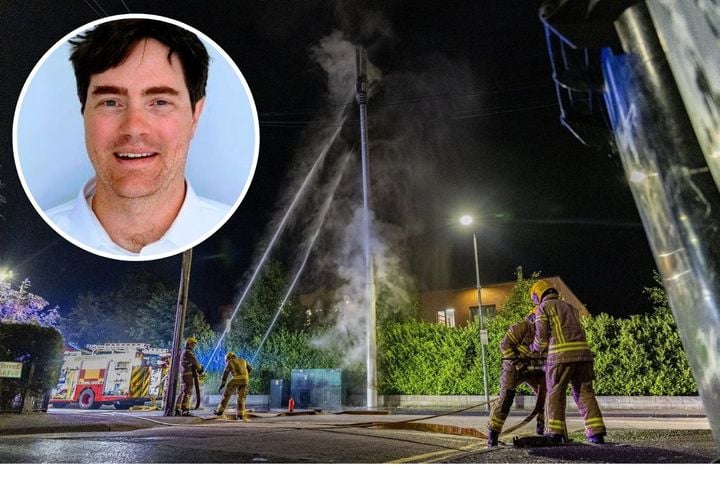Business
Belfast 5G Mast Attacks Linked to Community Surveillance Fears

Concerns over community surveillance have emerged as a significant factor behind the recent attacks on 5G masts in Belfast. According to Dr. Tristan Sturm, an academic at Queen’s University Belfast, the city’s complicated history may be contributing to fears surrounding these technological installations.
Dr. Sturm’s insights highlight a growing unease among residents, who view the radiation towers as potential tools for state surveillance rather than mere advancements in communication technology. This sentiment is rooted in a legacy of political strife and distrust in institutions, particularly in communities that have experienced historical marginalization.
The attacks on the masts, which have seen acts of vandalism and destruction, reflect a broader skepticism toward technological advancements that many perceive as invasive. In the wake of these incidents, Dr. Sturm emphasizes the importance of understanding the socio-political context in which these fears arise.
Historical Context and Modern Distrust
Belfast’s tumultuous past during the Troubles—a period marked by conflict and division—has left a lingering impact on community perceptions of authority and technology. Dr. Sturm notes that this historical backdrop plays a crucial role in shaping contemporary attitudes toward 5G networks. Residents may view the masts not just as infrastructure, but as symbols of government oversight and control.
In a city where the scars of conflict are still visible, the idea that surveillance could be conducted via seemingly innocuous technology resonates deeply with many. The notion that 5G masts might facilitate monitoring of personal activities has led to a surge in conspiracy theories, which often thrive in environments of distrust.
Dr. Sturm points out that conspiracy theories, while often dismissed as irrational, can serve as a coping mechanism for individuals trying to make sense of complex societal changes. These theories may provide explanations for feelings of vulnerability and powerlessness, particularly in communities that feel overlooked or misrepresented.
The Role of Misinformation
The spread of misinformation regarding 5G technology has further fueled fears and suspicions. Social media platforms have become breeding grounds for unfounded claims linking 5G to health risks and state surveillance efforts. This has exacerbated tensions, leading to a backlash against the infrastructure that many view as a threat rather than a benefit.
Dr. Sturm emphasizes the need for clearer communication from authorities regarding the safety and purpose of 5G technology. Without transparent dialogue, residents are likely to continue gravitating toward alternative narratives that align with their experiences and fears.
While some see the advancements in communication technology as essential for progress, others perceive them as potential tools for oppression. The challenge lies in bridging this divide and fostering a more nuanced understanding of the implications of 5G networks in a community still healing from past conflicts.
The attacks on 5G masts in Belfast are not simply acts of vandalism; they are manifestations of deeper societal issues. As the city grapples with its complex identity, addressing these concerns will be vital for moving forward and ensuring that technological advancements serve to unite rather than divide.
-

 Health3 months ago
Health3 months agoNeurologist Warns Excessive Use of Supplements Can Harm Brain
-

 Health3 months ago
Health3 months agoFiona Phillips’ Husband Shares Heartfelt Update on Her Alzheimer’s Journey
-

 Science2 months ago
Science2 months agoBrian Cox Addresses Claims of Alien Probe in 3I/ATLAS Discovery
-

 Science2 months ago
Science2 months agoNASA Investigates Unusual Comet 3I/ATLAS; New Findings Emerge
-

 Science1 month ago
Science1 month agoScientists Examine 3I/ATLAS: Alien Artifact or Cosmic Oddity?
-

 Entertainment5 months ago
Entertainment5 months agoKerry Katona Discusses Future Baby Plans and Brian McFadden’s Wedding
-

 Science1 month ago
Science1 month agoNASA Investigates Speedy Object 3I/ATLAS, Sparking Speculation
-

 Entertainment4 months ago
Entertainment4 months agoEmmerdale Faces Tension as Dylan and April’s Lives Hang in the Balance
-

 World3 months ago
World3 months agoCole Palmer’s Cryptic Message to Kobbie Mainoo Following Loan Talks
-

 Science1 month ago
Science1 month agoNASA Scientists Explore Origins of 3I/ATLAS, a Fast-Moving Visitor
-

 Entertainment2 months ago
Entertainment2 months agoLewis Cope Addresses Accusations of Dance Training Advantage
-

 Entertainment3 months ago
Entertainment3 months agoMajor Cast Changes at Coronation Street: Exits and Returns in 2025









